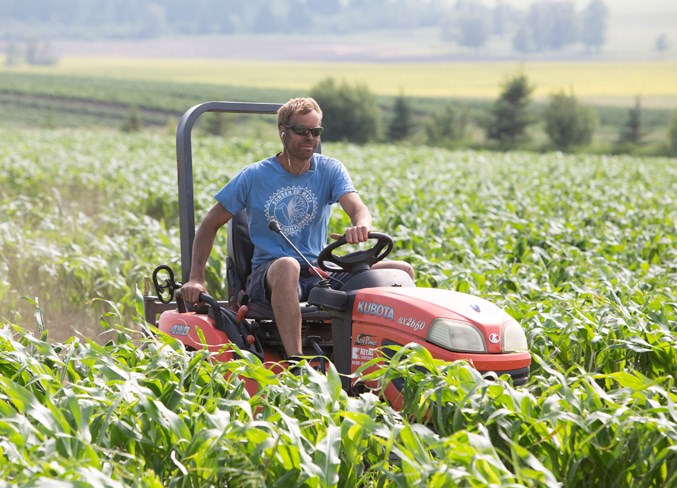There’s more than sunflower and corn mazes growing at Eagle Creek Farms, land that’s been in John Mills’ family for almost a century.
“I’m the fourth generation that’s farmed the land now,” Mills said. His great-grandfather bought the land in 1921.
There’s been different kinds of farming there over the years, including a large grain and cattle operation, but when Mills came back from several years away, he wanted to do something a bit different.
“It wasn’t the kinds farming I wanted to do,” he said.
Over the years he was gone, he’d studied agriculture at school and travelled to places like England, New Zealand and Australia, working on farms in those countries and exploring what other people did with their land.
First up, he started a U-pick for flowers. Since the farm is near Bowden, he came up with the idea of the farm's popular sunflower and corn mazes to encourage people to drive from the Calgary area for the U-pick.
Connections made at farmers markets and other events led him to start growing vegetables.
Nowadays, Eagle Creek Farms has U-pick strawberries, pumpkins, vegetables and flowers. The farm’s produce is also available at various farmers markets and through community-shared agriculture (CSA) programs.
More than 40 varieties of seed potatoes are grown and sold to market and individual gardeners. And of course there are still the popular sunflower and corn mazes.
“We grow pretty much everything. We don’t do eggplants, we don’t do sweet potatoes, but the majority of other vegetables we’ll grow,” Mills said. The 45 types of seed potatoes are the farm’s biggest crop grown on the full section he operates.
Interviewed in late June, Mills was expecting the official paperwork to arrive soon – the produce is now certified organic.
This is the first year the certification has been in place, though Mills has been using organic methods for years.
“I came back to the farm maybe 12 years ago. I studied organic production when I went to school in Nova Scotia, it just kind of jived with me,” he said. He started with the U-pick garden, trying to eliminate the use of chemicals.
“As I grew into doing the market garden and the CSA, I just kind of transferred those skills and it made sense to keep growing without chemicals … it’s one of those personal things, everyone has their own views.
"I think it’s more sustainable, personally,” Mills said.
Part of the drive to go organic is because Mills prefers to farm with fewer inputs, which he thinks is better for the health of the soil. The farm does require some inputs, he acknowledges, like the use of fuel and organic fertilizers, but he tries to limit how many.
Eagle Creek Farms has its own CSA program. With a CSA, people can sign up to receive boxes of produce throughout the season, taking a risk that there may be more or less than expected depending on the harvest. Somewhat unusually, Eagle Creek offers a winter share program in addition to the summer program.
“The difference is obviously there’s less of the leafy greens,” he said of the winter share. Many storage crops help make up the box in winter.
The first year Mills organized a CSA was 2010, and about 60 families signed up.
“We grew it for a number of years till about 2014, then we peaked at about 520 families we were serving,” Mills said.
But with a growing family, he wanted to start downsizing the program somewhat. Partnerships with other farms and organizations with CSA programs have allowed him to expand the amount of vegetables he grows, while the CSA-related work takes up less time than it used to.
“My philosophy on life and farming is I’m not out here to make a million dollars … we’re not big by any means. I really just want to live on the farm, I really enjoy the lifestyle, I want to raise the family out here,” he said.
The diversity on the farm helps him face the sometimes challenging environments in Alberta, whether it’s weather or the economy, he said. He likes the community in Central Alberta and with other farmers.
“I think as a group we can raise awareness of local food in Alberta,” he said.
Eating locally means knowing how the food is grown and getting to know the story of the local farms, he said. He also wonders about food security when so much food is imported from out-of-country in the event of supply chain disruption.
“Shop with a bigger vision in mind,” he said.
In Mills’ case, the story is of his family, with a wife, four young children, farming land that has been in his family for almost 100 years.
He’s been a farmer since he was a child on that same land.
“I think I was like six years old and riding in (the) combine and … my neighbour, he asked me, ‘Oh, are you going to be a farmer when you grow up?’ and I said ‘I already am a farmer,’” Mills said. “It’s just what I’ve always wanted to do.”



